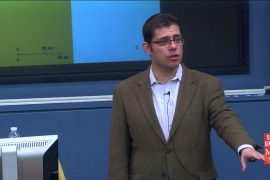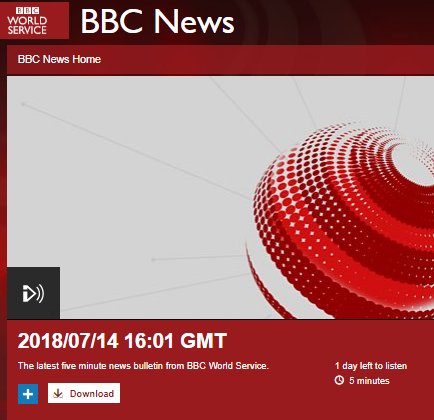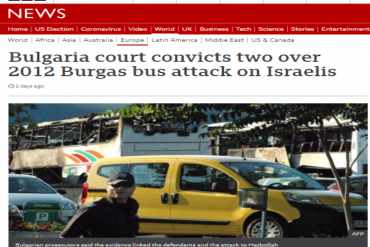Just over two years have gone by since Tim Franks did a special feature on Jerusalem (see ‘related articles’ below) for the BBC World Service radio programme ‘Newshour’ in which he went to visit the Givat HaMatos neighbourhood, where he discussed what was inaccurately represented as a ‘new’ development project with a representative from the political NGO ‘Ir Amim‘.
The January 30th 2017 edition of ‘Newshour’ found the same BBC reporter revisiting the same location with the founder of that same NGO.
Franks’ very long report – over twelve and a half minutes – was billed by presenter Razia Iqbal as follows at the start of the programme:
“In about half an hour we’ll be live from Jerusalem with Newshour’s Tim Franks discussing settlements, the two-state solution and the impact of President Trump.”
The report itself (from 30:12 here) commenced with Franks explaining its rationale as being based on things “some say”:
Iqbal: “Let’s go now to Newshour’s Tim Franks in Jerusalem.”
Franks: “Razia, I’ve been coming to Jerusalem a fair bit over the last ten years. I used to live here as the BBC’s Middle East correspondent and there’s one refrain I’ve heard ahead of this trip which it feels like I’ve heard pretty much every time I’ve been back: nothing’s changed – it’s all just a bit worse. So is that right? Are we in a slightly dispiriting holding pattern or are we, as some say, at a tipping point? A moment when the reality on the ground, the new administration in Washington, mean that the stalemate between Israel and the Palestinians is going to enter a new, decisive phase? It’s a question we’re going to look at through the week in strikingly different locations across this small patch of land that Israelis and Palestinians share.”
First, the city that means so much to so many. We’re going to begin in the religious, the historical, the emotional heart of it all: in Jerusalem. I say Jerusalem; the Old City is about six or seven kilometres up the road from here. This is Givat HaMatos – an area of scrubland really – on the outskirts of Jerusalem. Just a couple of kilometres behind me to the south is the Palestinian city of Bethlehem. And I’m here with a man called Danny Seidemann – he’s an Israeli attorney and specialist on the mapping of Jerusalem. And Danny; Givat HaMatos matters in what way?”
As was the also case when Franks provided Seidemann with a platform in the programme from just over two years ago, that introduction is inadequate. Once again Franks failed to inform audiences that Seidemann is the founder of the foreign government funded (including the UK) political NGO Terrestrial Jerusalem and that he also founded Ir Amim. That context – had it been supplied with an explanation of the political agenda of the organisations to which Seidemann is linked – would have better allowed BBC audiences to put his ensuing words – including his interpretation of the two-state solution – into their appropriate context.
Seidemann: “Givat HaMatos is pretty unique. It’s one of two or three schemes that we call a Doomsday settlement. These settlements are in and of themselves capable of making the two-state solution impossible. Why? The heart of the two-state solution is a very simple deal: end of occupation in exchange of a recognized border, legitimacy and security. End of occupation means that in any permanent status agreement, no Palestinians in East Jerusalem would be left under Israeli rule. And what that means is that all of East Jerusalem – the Palestinian built-up areas – will become part of the Palestinian state: a contiguous and viable Palestinian state with East Jerusalem as its capital and with all of the Palestinians in East Jerusalem no longer living under Israeli rule.”
Franks: “Danny, can I just interrupt you. How does that square with the avow by this government, by the mayor of Jerusalem, by countless generations of Israeli politicians, that Jerusalem will never be divided again?”
Seidemann: “I assert that the only place that Jerusalem is the undivided capital of Israel that will never be re-divided is in the fertile imaginations of Right-wing ideologues. Jerusalem is a bi-national city. It is de facto a divided city and it is a hotly contested city. The question that remains is is it possible to take a pen and draw a line on a map that will carve out a viable and contiguous Palestinian city and leave in its wake an equally robust and viable Israeli city? Today that is possible. Once Givat HaMatos will be built it will no longer be possible. This can take place without further warning. As early as tomorrow morning the tenders for the construction of the first 1,500 units can be issued.”
Franks refrained from informing listeners that there is nothing remotely new about the plan to build housing in Givat HaMatos and that the neighbourhood was the site of temporary housing for new immigrants from the former USSR and Ethiopia from 1991 onwards, with initiatives to replace caravans with proper housing having first been proposed over a decade ago. He continued:
Franks: “What’s to stop, in that case, the Israeli government or the mayor of Jerusalem deciding that they do want to build here? There’s a terrible housing shortage in Jerusalem. Prices are through the roof. You’ve got a friendly administration in Washington. Why not build?”
Seidemann: “The popular image that Netanyahu has is that he is impervious to engagement and is not deterred. I disagree with that. There is a…has been…a wall to wall consensus internationally that there will be serious consequences in relations between Israel and the rest of the world should we pursue this and this has clearly deterred Netanyahu from doing so. Having said that, for the first time since 1967 and for the past ten days, we have a situation where there is an administration in Washington that apparently does not oppose settlements and some of the key people in the administration embrace settlements. And that means that the discreet mechanism that has applied the brakes on some of these detrimental developments is now gone. And nobody knows what the dynamics is going to be. The eventuality of construction in Givat HaMatos is greater today than ever it was in the past and its impact will be devastating.”
The BBC has been reporting on the Givat HaMatos project since 2012. Tim Franks should therefore be aware of the fact that since the beginning, half the proposed housing units there have been ear-marked for Arab residents of the adjacent neighborhood of Beit Safafa. However, he chose not to inform listeners of that fact before providing the next cue for his interviewee.
Franks: “What’s to say that – if there were building here in Givat HaMatos – that it would be, as you describe it, Israeli building? I mean the mayor of Jerusalem says ‘look, we build for Arabs, we build for Jews’. There’s not going to be any flags on the building saying ‘Jews only’.”
Seidemann: “As a rule that claim is entirely disingenuous. Israel built 55 thousand homes on lands expropriated from Palestinians and on paper it’s…”
Franks: “In East Jerusalem.”
Seidemann: “In East Jerusalem. On paper it’s available to everybody. The patterns of life are that Israelis and Palestinians live in separate areas and there are very, very few Palestinians residing in these areas and it is false innocence to claim otherwise.”
The interview with Seidemann ends there, with Franks failing to question the basic assertion which the BBC has been dutifully repeating and amplifying since 2012: that development of the Givat HaMatos neighbourhood would mean an end to the two-state solution. Likewise, Franks made no effort to challenge the assumption of ‘Palestinian land’ and failed to provide the all-important historical context of the 19-year Jordanian occupation of Jerusalem or the expulsion of Jews from parts of Jerusalem in 1948.
The inadequate introduction of Seidemann as “an Israeli attorney and specialist on the mapping of Jerusalem” breaches BBC editorial guidelines on impartiality which state that:
“We should not automatically assume that contributors from other organisations (such as academics, journalists, researchers and representatives of charities) are unbiased and we may need to make it clear to the audience when contributors are associated with a particular viewpoint, if it is not apparent from their contribution or from the context in which their contribution is made.”
Clearly audiences should have been informed of Seidemann’s links to NGOs with a very clear political agenda on this topic and the fact that they were not means that this item steered audiences towards viewing particular and partial political claims as fact.
The rest of this audio report will be discussed in part two of this post.
Related Articles:




